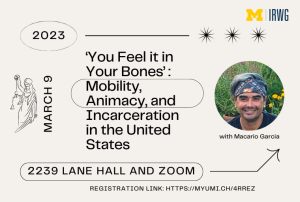Presented By: Institute for Research on Women and Gender
‘You Feel it in Your Bones’: Mobility, Animacy, and Incarceration in the United States
Macario Garcia, Assistant Professor of Anthropology, Kennesaw State University

In this presentation, I explore the ways in which incarcerated people center mobility in conceptualizing what counts as alive and human. I draw on ethnographic research that I conducted between 2016 and 2017 at the Desert Echo Facility (pseudonym), a state prison in the American Southwest that holds individuals from minimum to high-security levels. Some incarcerated people feel supposedly inanimate objects, such as walls and floors, moving, while others feel vibrations moving across the compound. For many of the incarcerated, physical movement signifies aliveness – meaning that incarceration forces them to question if they are less alive than the “inanimate” materials that confine them. Others understand these movements as the direct violence of the state that represent purposeful disruptions to the ways they construct relations. In this context, incarcerated peoples’ alive status is no longer a given and their relations no longer assumed to be inherent and ongoing, but rather, processes to be negotiated within criminal punishment systems. I focus on what these movements mean to incarcerated people, and how they situate these movements within often competing ontological frameworks informed by histories of and ongoing settler violence in what came to be known as the United States.
Content warning: There are examples of physical violence, carceral trauma, and feelings of self-harm in this presentation.
About the Speaker:
Dr. Macario Garcia is a cultural anthropologist with a focus on mobility, animacy, incarceration, and prison-industrial complex abolition. They earned their PhD from the University of Virginia and MA degrees from University of Virginia and American Public University. They are currently partnering with incarcerated people to create maps of carceral migration in the United States and to document oral histories across correctional landscapes.
Content warning: There are examples of physical violence, carceral trauma, and feelings of self-harm in this presentation.
About the Speaker:
Dr. Macario Garcia is a cultural anthropologist with a focus on mobility, animacy, incarceration, and prison-industrial complex abolition. They earned their PhD from the University of Virginia and MA degrees from University of Virginia and American Public University. They are currently partnering with incarcerated people to create maps of carceral migration in the United States and to document oral histories across correctional landscapes.
